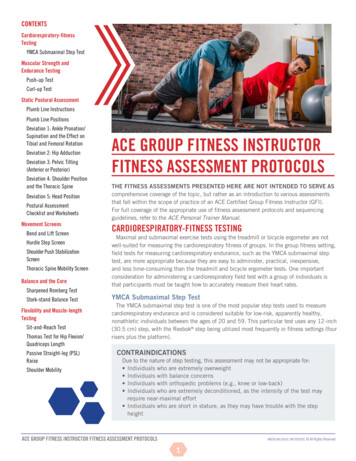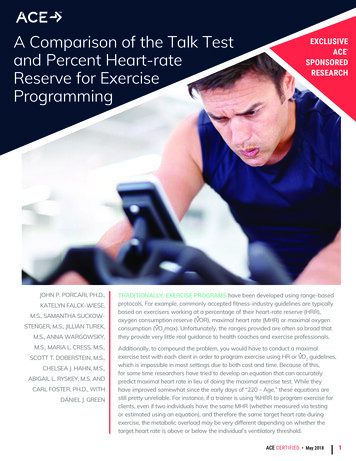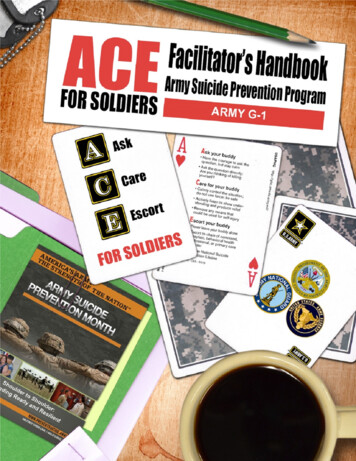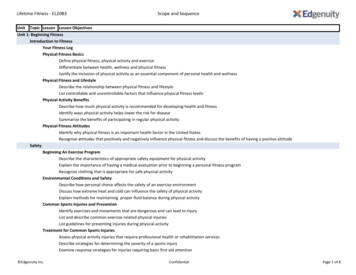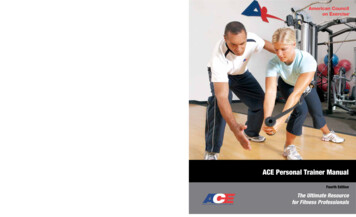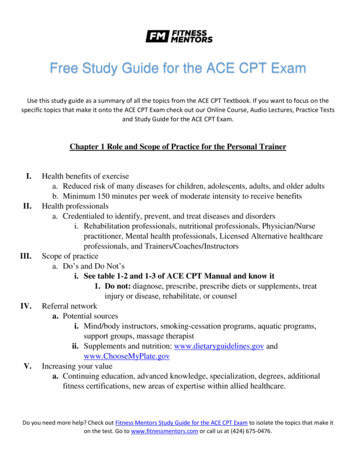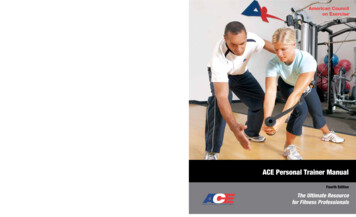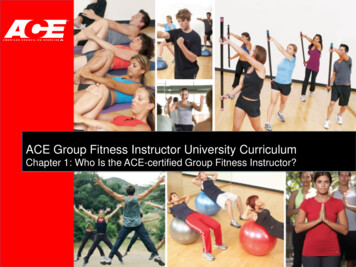
Transcription
ACE Group Fitness Instructor University CurriculumChapter 1: Who Is the ACE-certified Group Fitness Instructor?
Learning Objectives Upon completion of this chapter, you will beable to: Define the ACE-certified group fitness instructor’s(GFI) scope of practice List the primary concepts of the ACE Code ofEthics State the duration of the GFI certification periodand explain the process of renewal Describe strategies to further enhance the GFI’scareer development
Introduction The human body responds to the stress of physicalmovement with improved fitness and health. 2008 Physical Activity Guidelines for Americans(U.S. Department of Health & Human Services) Regular physical activity reduces the risk of many adversehealth outcomes. For most health outcomes, additional benefits occur as theamount of physical activity increases. Most health benefits occur with at least 150 minutes a weekof moderate-intensity physical activity, such as briskwalking. Both aerobic and muscle-strengthening activity arebeneficial. Health benefits occur across all population groups. The health benefits of physical activity occur for people withdisabilities. The benefits of physical activity far outweigh the possibilityof adverse outcomes.
Fitness Professionals Help Participants Improve Health Physicians generally do not provide specificinstructions for how to exercise. ACE-certified GFIs play a vital role in alliedhealthcare. They help participants achieve positive health andfitness improvements. Combating rising levels of obesity and diseasesrelated to lifestyle choices has led to a positiveoutlook for professionals in the fitness industry.
The Allied Healthcare Continuum The allied healthcare continuum iscomposed of health professionals who arecredentialed through: Certifications Registrations Licensure Physicians are at the top of the alliedhealthcare pyramid, evaluating patients todiagnose ailments and implement treatmentplans, or referring patients to specialists asneeded.
The Role of Fitness Professionals The role of fitness professionals in relation tothe other members of the healthcare team ispresented on the following slide. The GFI should obtain written permissionfrom the participant to communicate with thereferring physician. Even when participants do not have aphysician’s referral, it is important to maintainconfidential records that include theparticipant’s: Program Progress Health-history information
Specialty Areas Within Allied HealthcareNote: AHFS Advanced Health & Fitness Specialist; LWMC Lifestyle & Weight Management Coach
The ACE Group Fitness InstructorCertification Candidates must meet or surpass a level of“minimum competency” as assessed by acompetency-based evaluation (exam) toshow that they are adequately qualified towork in the profession. The primary purpose of a certification is toprotect the public from harm. An ACE-certified GFI has provencompetence in: Making safe and effective exercise-programmingdecisions in a variety of class situations Minimizing exercise participant risk and exposureto harm
Defining “Scope of Practice” A scope of practice defines the: Legal range of services thatprofessionals in a given fieldcan provide Settings in which thoseservices can be provided Guidelines or parameters thatmust be followed The laws, rules, andregulations that govern aprofession are established forthe protection of the public. Fitness professionals as acollective group have a generalscope of practice, as presentedon the following slide.
ACE GFI General Scope of Practice Developing and implementing exerciseprograms Conducting pre-exercise health screens andfitness assessments Goal setting Teaching correct exercise methods andparticipant-monitoring techniques Implementing effective motivation andadherence strategies Educating participants about relevant topics Protecting participant confidentiality Health Insurance Portability and AccountabilityAct (HIPAA)
Working With Other Healthcare Professionals A GFI should not make recommendationsthat contradict those of a participant’shealthcare team. Each state, province, and country hasspecific laws about the responsibilities ofdifferent healthcare professions. It is the responsibility of the GFI to: Learn and adhere to the laws in his or hergeographical area Work within the ACE-certified GFI scope ofpractice and adhere to the ACE Code of Ethics
Knowledge, Skills, and Abilities The ACE GFI Certification is designed for fitnessprofessionals wanting to provide general exerciseleadership to apparently healthy individuals. The certification program is continually evaluated. The outline of tasks, knowledge, and skills is publishedas the ACE Group Fitness Instructor Exam ContentOutline Appendix B in the ACE Group Fitness Instructor Manual,3rd ed.
Education and Experience To prepare for the ACE GFI CertificationExam, candidates may choose from: Preparatory courses or workshops delivered liveor online Educational internships Professional experience College courses Each candidate must select his or her ownpath based on time, financial resources,learning styles, and personal factors. ACE recommends three to six months ofstudy time to adequately prepare.
Preparation and Testing ACE Certification CandidateHandbook -Exam-Candidate-Handbook.pdf This complimentary handbookexplains: How ACE certification exams aredeveloped What the candidate should expect The procedures for earning andmaintaining an ACE certification Multiple-choice and client-scenarioquestions found on the ACE certificationexams Test-taking strategies and available studyresources
Professional Responsibilities and Ethics ACE has established a professionalethical code of conduct anddisciplinary procedures. ACE certifications have all receivedthird-party accreditation from theNational Commission for CertifyingAgencies (NCCA). ACE has developed the ACE Code ofEthics to serve as a guide for ethicaland professional practices for all ACEcertified Professionals. x All ACE-certified Professionals mustcomply with the ACE Code of Ethics.
ACE Code of Ethics ACE-certified Professionals will endeavor to: Provide safe and effective instruction Provide equal and fair treatment to all clients/participants Stay up-to-date on the latest health and fitness research andunderstand its practical application Maintain current CPR certification and knowledge of first-aidservices Comply with all applicable business, employment, andintellectual property laws Maintain the confidentiality of all client/participant information Refer clients/participants to more qualified health or medicalprofessionals when appropriate Uphold and enhance public appreciation and trust for thehealth and fitness industry Establish and maintain clear professional boundaries
Professional Practices and Disciplinary Procedures ACE may revoke or otherwise take action with regard tothe application or certification of an individual in thecase of: Ineligibility for certification Irregularity in connection with any certification examination Unauthorized possession, use, access, or distribution ofconfidential or proprietary ACE documents or materials Material misrepresentation or fraud in any statement to ACE or tothe public Any physical, mental, or emotional condition that impairscompetent and objective professional performance Negligent and/or intentional misconduct in professional work The timely conviction, plea of guilty, or plea of nolo contendere(“no contest”) in connection with a felony or misdemeanor that isdirectly related to public health and/or fitness instruction oreducation Failure to meet the requirements for certification or recertification
Disciplinary Process ACE has developed a three-tiered disciplinaryprocess. The process consists of review, hearing, and appealsto ensure fair and unbiased examination of allegedviolation(s) of the Application and CertificationStandards in order to: Determine the merit of allegations Impose appropriate sanctions as necessary to protectthe public and the integrity of the certification process
Certification Period and Renewal ACE certifications are valid for two years from the dateearned. To renew, ACE-certified Professionals must: Complete a minimum of 20 hours of continuing education credits(2.0 CECs) Maintain a current certificate in cardiopulmonary resuscitation(CPR) and, if living in North America, automated externaldefibrillation (AED) Certified professionals should complete additionalcontinuing education. The ramifications for allowing an ACE certification toexpire include: Not being able to advertise the fact that they hold the ACEcertification until it is renewed Discontinued professional liability insurance Loss of employment
Participant Privacy Participants will share confidential information withthe GFI. To help prevent violations of participant privacy, ACEcertified Professionals should adhere to the HealthInsurance Portability and Accountability Act (HIPAA). Following HIPAA regulations can help maintain theconfidentiality of each client’s protected healthinformation.
Referral GFIs must refer participants who require servicesoutside their scope of practice. Proper referral ensures that participants are providedwith appropriate care from qualified providers. Referrals can also come to the GFI from other healthprofessionals.
Developing a Referral Network GFIs should identify allied healthprofessionals who are reputable. Potential referral sources include:–Mind/body instructors–Smoking-cessation programs–Aquatic exercise programs–Support groups–Massage therapists Research potential referrals beforerecommending any programs or servicesto a participant. With proper networking, the GFI mayalso gain referrals from the other healthand fitness professionals within thenetwork.
Safety All fitness professionals should do what they can tominimize risk for everyone in the fitness facility, including: Proper equipment maintenance and storage Ensuring appropriate cleanliness of the facility Understanding emergency procedures Conducting a health-history assessment Determining appropriate levels of intensity for initial exerciseprogram design Helping clients perform exercises in a safe and effectivemanner with proper progressions Even with the best risk-management program, injuries andincidents can still occur. As such, ACE recommends that all ACE-certifiedProfessionals carry professional liability insurance.
Supplements Supplements are not regulated by the U.S.Food and Drug Administration (FDA). It is not illegal for fitness facilities to sellcommercial nutritional supplements. However, it is irresponsible for them to providesupplement recommendations without theappropriate staff to give such advice. GFIs are not qualified to recommendsupplements to clients. Unless a GFI is also a registered dietitian or aphysician, he or she does not have the expertiseor legal qualifications necessary to recommendsupplements.
Educating Participants AboutSupplements GFIs should educate themselves aboutsupplements. The GFI should help the participantunderstand that:– Fitness goals can be reached withoutsupplements– Supplements can have negative and potentiallyharmful side effects Some participants insist on using dietarysupplements.– The GFI should refer the participant to a qualifiedphysician or registered dietitian for guidance.
Ramifications of Offering Inappropriate Services Offering services that are within the legalrealm of other healthcare professions is inviolation of the ACE Code of Ethics. The GFI is qualified to help participants with: General exercise programming needs Basic nutrition information based on the USDA’sDietary Guidelines for Americans 2010
Accreditation of Allied Healthcare Credentials The acceptance of fitness professionals as legitimatemembers of the allied healthcare team has beenlacking. As a result, ACE has earned third-party accreditationfrom the NCCA for its fitness certification programs. The NCCA has reviewed and accredited thecertification programs for most professions withinallied healthcare.
Recognition From the Fitness and Health Industry NCCA accreditation is recognized as thethird-party standard for accreditation ofcertifications for GFIs. NCCA accreditation is also recognized bythe following fitness industry professionaltrade organizations: The Medical Fitness Association (MFA) The International Health, Racquet, andSportsclub Association (IHRSA) Requirements for hiring fitness professionalsthat recognize the NCCA accreditation arebeing developed.
Recognition From the Education Community The ACE GFI college curriculum: Helps instructors with course design Provides discounts on the study materials forstudents Helps exercise science departments meet one ofthe primary outcome assessments stated in theStandards and Guidelines for the Accreditation ofEducational Programs for Personal FitnessTraining from the Commission on Accreditation ofAllied Health Education Programs
Recognition From the Department of Labor The Department of Labor (DOL) reports thatmost organizations encourage GFIs toobtain certification in the fitness field andmany require it to gain employment. ACE is specifically identified by the DOL asoffering quality certifications for GFIs.
Career Development A GFI who wants full-time employment infitness should have a general idea of his orher career path. Career paths are guidelines to help theprofessional reach certain career goals. A career plan can help a professionaldetermine if a continuing education offeringis in line with his or her goals. A career plan can be used as a template forresearching and selecting continuing education towork toward a GFI’s goals.
Continuing Education Completing continuing education in one ormore areas of focus can advance a GFI’scareer. Factors to consider when selectingcontinuing education courses include: Checking if the course will be at the appropriatelevel Seeing if the instructor has the appropriatequalifications to teach the course Learning if the course is ACE-approved or willhave to be petitioned for continuing educationscredits (CECs) Determining if the education provided is within thescope of practice
Specialization Specialization is a way tobecome recognized as an“expert” for a particular type ofexercise or client population. Areas of specialization should beselected based on a GFI’s: Desired career path Interests Participant base The area of specializationshould: Fall within the scope of practice Provide the GFI with knowledgethat is complementary to what heor she does within the scope ofpractice
Additional Fitness Certifications ACE encourages fitness professionals toearn certifications that provide them withnew areas of expertise. For example: GFIs can benefit from ACE’s Personal Trainercertification. Fitness professionals can benefit from ACE’sLifestyle & Weight Management Coach (LWMC)certification. Advanced or experienced fitness professionalscan benefit from ACE’s Advanced Health &Fitness Specialist (AHFS) certification.
New Areas of Expertise Within Allied Healthcare A GFI who wants to expand his or herservices must earn the appropriatecredentials. This could include: Becoming a licensed massage therapist Earning a nutrition degree and becoming aregistered dietitian Earning a master’s degree in physical therapyand becoming a licensed physical therapist Going to medical school and becoming a medicaldoctor In all of these situations, the GFI canbecome an advocate for exercise in his orher new professional arena.
Summary Many of the professions in healthcare aredevoted to treating disease, while a GFIprimarily helps people avoid disease. The role that ACE-certified GFIs play in thehealthcare continuum has never been moreimportant. This chapter covered: The allied healthcare continuum The ACE GFI Certification Accreditation of allied healthcare credentialsthrough the NCCA Career development
The GFI should help the participant understand that: - Fitness goals can be reached without supplements - Supplements can have negative and potentially harmful side effects Some participants insist on using dietary supplements. - The GFI should refer the participant to a qualified physician or registered dietitian for guidance.
